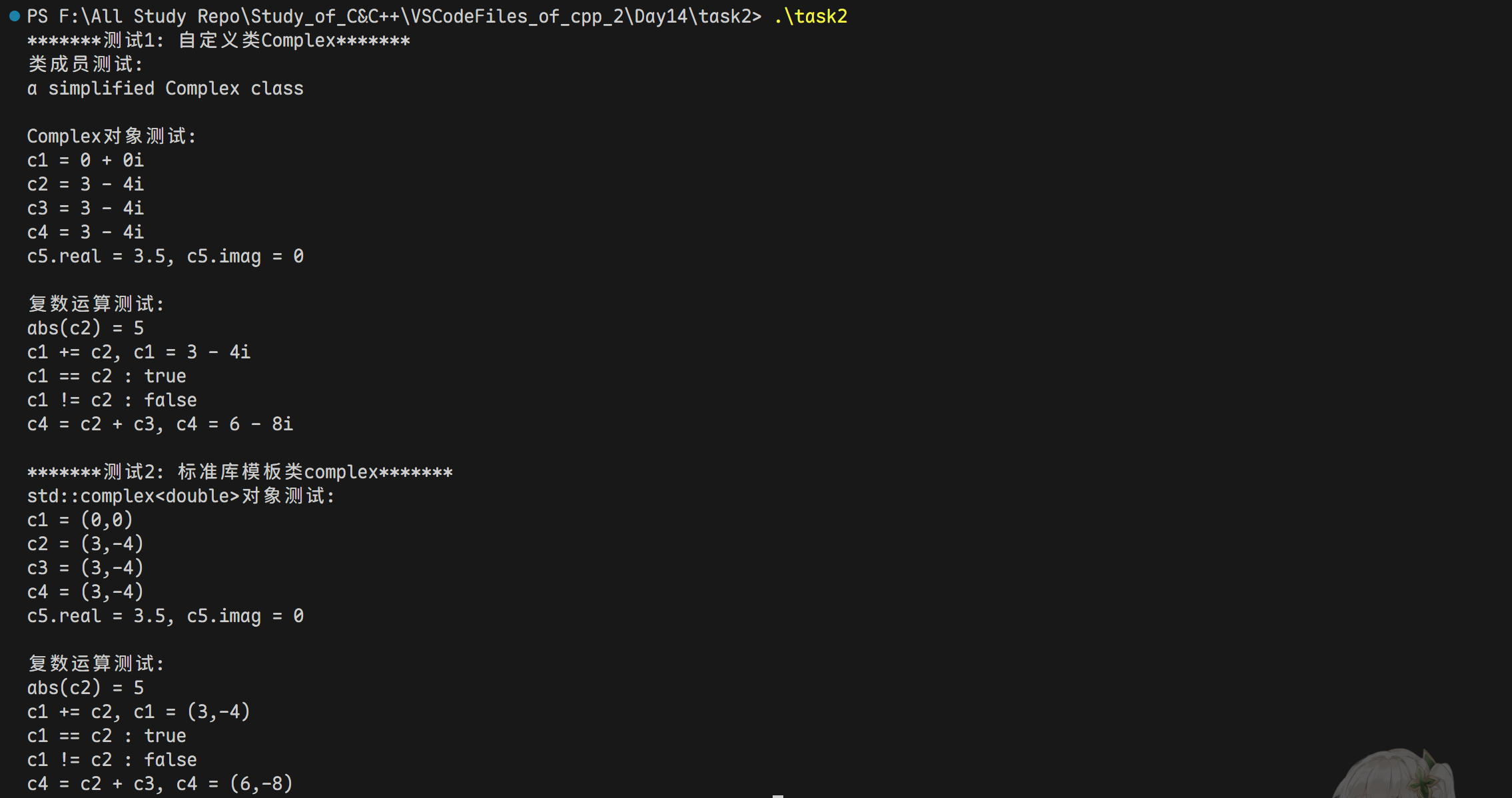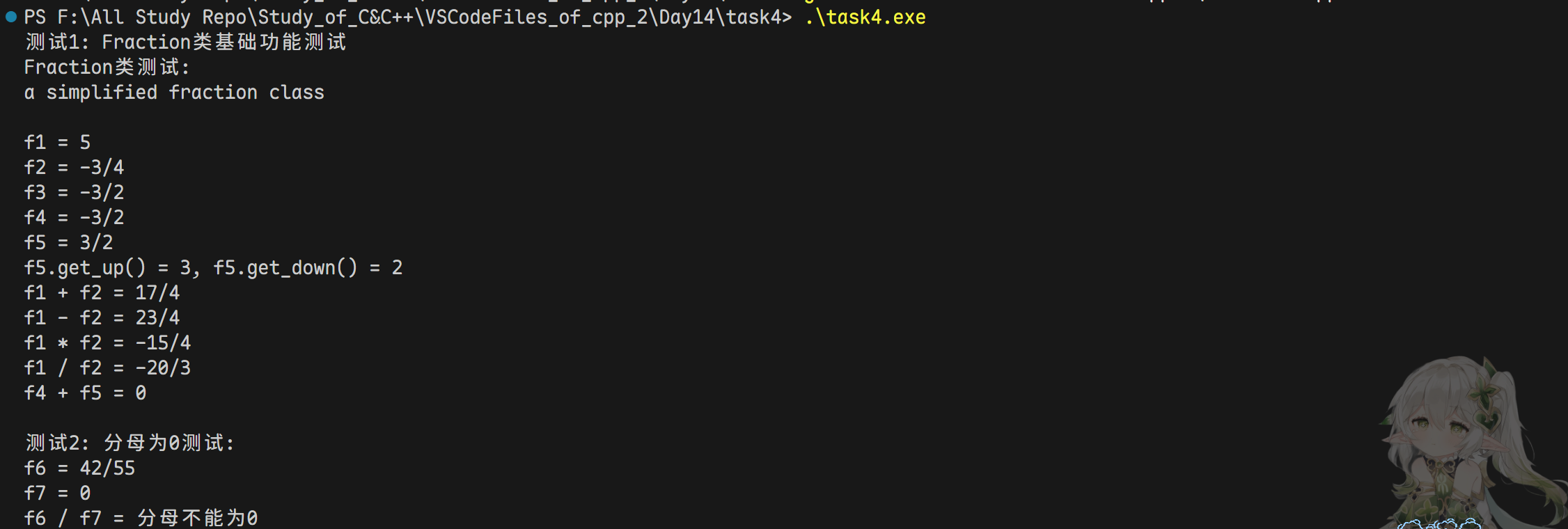OOP实验二
任务一
验证性实验
源码
T.h
#pragma once
#include <string>
// 类T: 声明
class T {
// 对象属性、方法
public:
T(int x = 0, int y = 0); // 普通构造函数
T(const T &t); // 复制构造函数
T(T &&t); // 移动构造函数
~T(); // 析构函数
void adjust(int ratio); // 按系数成倍调整数据
void display() const; // 以(m1, m2)形式显示T类对象信息
private:
int m1, m2;
// 类属性、方法
public:
static int get_cnt(); // 显示当前T类对象总数
public:
static const std::string doc; // 类T的描述信息
static const int max_cnt; // 类T对象上限
private:
static int cnt; // 当前T类对象数目
// 类T友元函数声明
friend void func();
};
// 普通函数声明
void func();
T.cpp
#include "T.h"
#include <iostream>
#include <string>
// 类T实现
// static成员数据类外初始化
const std::string T::doc{"a simple class sample"};
const int T::max_cnt = 999;
int T::cnt = 0;
// 类方法
int T::get_cnt() {
return cnt;
}
// 对象方法
T::T(int x, int y): m1{x}, m2{y} {
++cnt;
std::cout << "T constructor called.\n";
}
T::T(const T &t): m1{t.m1}, m2{t.m2} {
++cnt;
std::cout << "T copy constructor called.\n";
}
T::T(T &&t): m1{t.m1}, m2{t.m2} {
++cnt;
std::cout << "T move constructor called.\n";
}
T::~T() {
--cnt;
std::cout << "T destructor called.\n";
}
void T::adjust(int ratio) {
m1 *= ratio;
m2 *= ratio;
}
void T::display() const {
std::cout << "(" << m1 << ", " << m2 << ")" ;
}
// 普通函数实现
void func() {
T t5(42);
t5.m2 = 2049;
std::cout << "t5 = "; t5.display(); std::cout << '\n';
}
task1.cpp
#include "T.h"
#include <iostream>
void test_T();
int main() {
std::cout << "test Class T: \n";
test_T();
std::cout << "\ntest friend func: \n";
func();
}
void test_T() {
using std::cout;
using std::endl;
cout << "T info: " << T::doc << endl;
cout << "T objects'max count: " << T::max_cnt << endl;
cout << "T objects'current count: " << T::get_cnt() << endl << endl;
T t1;
cout << "t1 = "; t1.display(); cout << endl;
T t2(3, 4);
cout << "t2 = "; t2.display(); cout << endl;
T t3(t2);
t3.adjust(2);
cout << "t3 = "; t3.display(); cout << endl;
T t4(std::move(t2));
cout << "t4 = "; t4.display(); cout << endl;
cout << "test: T objects'current count: " << T::get_cnt() << endl;
}
结果

回答
-
可见报错为在作用域内未声明
func函数, 因为func()是类外定义的友元函数,必须先声明.

-
构造函数用于对象初始化,复制构造用于拷贝已有对象,移动构造用于资源转移,析构函数用于资源释放。
-
静态成员变量必须在类外初始化,否则链接失败。
-

任务二
Complex
源码
Complex.h
#pragma once
#include <string>
class Complex
{
public:
static const std::string doc;
Complex();
Complex(double r);
Complex(double r, double i);
Complex(const Complex &c);
double get_real() const;
double get_imag() const;
void add(const Complex &c);
friend void output(const Complex &c);
friend double abs(const Complex &c);
friend Complex add(const Complex &a, const Complex &b);
friend bool is_equal(const Complex &a, const Complex &b);
friend bool is_not_equal(const Complex &a, const Complex &b);
private:
double real, imag;
};
Complex.cpp
#include "Complex.h"
#include <iostream>
#include <cmath>
const std::string Complex::doc{"a simplified Complex class"};
Complex::Complex() : real{0}, imag{0} {}
Complex::Complex(double r) : real{r}, imag{0} {}
Complex::Complex(double r, double i) : real{r}, imag{i} {}
Complex::Complex(const Complex &c) : real{c.real}, imag{c.imag} {}
double Complex::get_real() const { return real; }
double Complex::get_imag() const { return imag; }
void Complex::add(const Complex &c)
{
real += c.real;
imag += c.imag;
}
void output(const Complex &c)
{
std::cout << c.real << (c.imag >= 0 ? " + " : " - ") << std::abs(c.imag) << "i";
}
double abs(const Complex &c)
{
return std::sqrt(c.real * c.real + c.imag * c.imag);
}
Complex add(const Complex &a, const Complex &b)
{
return Complex(a.real + b.real, a.imag + b.imag);
}
bool is_equal(const Complex &a, const Complex &b)
{
return a.real == b.real && a.imag == b.imag;
}
bool is_not_equal(const Complex &a, const Complex &b)
{
return !is_equal(a, b);
}
task2.cpp
// 待补足头文件
// xxx
#include <iostream>
#include <iomanip>
#include <complex>
#include "Complex.h"
void test_Complex();
void test_std_complex();
int main()
{
std::cout << "*******测试1: 自定义类Complex*******\n";
test_Complex();
std::cout << "\n*******测试2: 标准库模板类complex*******\n";
test_std_complex();
}
void test_Complex()
{
using std::boolalpha;
using std::cout;
using std::endl;
cout << "类成员测试: " << endl;
cout << Complex::doc << endl
<< endl;
cout << "Complex对象测试: " << endl;
Complex c1;
Complex c2(3, -4);
Complex c3(c2);
Complex c4 = c2;
const Complex c5(3.5);
cout << "c1 = ";
output(c1);
cout << endl;
cout << "c2 = ";
output(c2);
cout << endl;
cout << "c3 = ";
output(c3);
cout << endl;
cout << "c4 = ";
output(c4);
cout << endl;
cout << "c5.real = " << c5.get_real()
<< ", c5.imag = " << c5.get_imag() << endl
<< endl;
cout << "复数运算测试: " << endl;
cout << "abs(c2) = " << abs(c2) << endl;
c1.add(c2);
cout << "c1 += c2, c1 = ";
output(c1);
cout << endl;
cout << boolalpha;
cout << "c1 == c2 : " << is_equal(c1, c2) << endl;
cout << "c1 != c2 : " << is_not_equal(c1, c2) << endl;
c4 = add(c2, c3);
cout << "c4 = c2 + c3, c4 = ";
output(c4);
cout << endl;
}
void test_std_complex()
{
using std::boolalpha;
using std::cout;
using std::endl;
cout << "std::complex<double>对象测试: " << endl;
std::complex<double> c1;
std::complex<double> c2(3, -4);
std::complex<double> c3(c2);
std::complex<double> c4 = c2;
const std::complex<double> c5(3.5);
cout << "c1 = " << c1 << endl;
cout << "c2 = " << c2 << endl;
cout << "c3 = " << c3 << endl;
cout << "c4 = " << c4 << endl;
cout << "c5.real = " << c5.real()
<< ", c5.imag = " << c5.imag() << endl
<< endl;
cout << "复数运算测试: " << endl;
cout << "abs(c2) = " << abs(c2) << endl;
c1 += c2;
cout << "c1 += c2, c1 = " << c1 << endl;
cout << boolalpha;
cout << "c1 == c2 : " << (c1 == c2) << endl;
cout << "c1 != c2 : " << (c1 != c2) << endl;
c4 = c2 + c3;
cout << "c4 = c2 + c3, c4 = " << c4 << endl;
}
结果

回答
- 标准库更简洁,重载运算符用起来巴适得很.
-
- 是,需要访问私有成员
-
- 并非友元函数 见cpp文档
-
- 当需要访问私有成员但不希望暴露接口时使用
friend。
- 当需要访问私有成员但不希望暴露接口时使用
任务三
播放器
源码
PlayerControl.h
#pragma once
#include <string>
enum class ControlType
{
Play,
Pause,
Next,
Prev,
Stop,
Unknown
};
class PlayerControl
{
public:
PlayerControl();
ControlType parse(const std::string &control_str); // 实现std::string --> ControlType转换
void execute(ControlType cmd) const; // 执行控制操作(以打印输出模拟)
static int get_cnt();
private:
static int total_cnt;
};
PlayerControl.cpp
#include "PlayerControl.h"
#include <iostream>
#include <algorithm>
int PlayerControl::total_cnt = 0;
PlayerControl::PlayerControl() {}
// 待补足
// 1. 将输入字符串转为小写,实现大小写不敏感
// 2. 匹配"play"/"pause"/"next"/"prev"/"stop"并返回对应枚举
// 3. 未匹配的字符串返回ControlType::Unknown
// 4. 每次成功调用parse时递增total_cnt
ControlType PlayerControl::parse(const std::string &control_str)
{
std::string cmd = control_str;
std::transform(cmd.begin(), cmd.end(), cmd.begin(), ::tolower);
++total_cnt;
if (cmd == "play")
return ControlType::Play;
if (cmd == "pause")
return ControlType::Pause;
if (cmd == "next")
return ControlType::Next;
if (cmd == "prev")
return ControlType::Prev;
if (cmd == "stop")
return ControlType::Stop;
return ControlType::Unknown;
}
void PlayerControl::execute(ControlType cmd) const
{
switch (cmd)
{
case ControlType::Play:
std::cout << "[play] Playing music...\n";
break;
case ControlType::Pause:
std::cout << "[Pause] Music paused\n";
break;
case ControlType::Next:
std::cout << "[Next] Skipping to next track\n";
break;
case ControlType::Prev:
std::cout << "[Prev] Back to previous track\n";
break;
case ControlType::Stop:
std::cout << "[Stop] Music stopped\n";
break;
default:
std::cout << "[Error] unknown control\n";
break;
}
}
int PlayerControl::get_cnt()
{
return total_cnt;
}
task3.cpp
#include "PlayerControl.h"
#include <iostream>
void test()
{
PlayerControl controller;
std::string control_str;
std::cout << "Enter Control: (play/pause/next/prev/stop/quit):\n";
while (std::cin >> control_str)
{
if (control_str == "quit")
break;
ControlType cmd = controller.parse(control_str);
controller.execute(cmd);
std::cout << "Current Player control: " << PlayerControl::get_cnt() << "\n\n";
}
}
int main()
{
test();
}
结果

任务四
Fraction
源码
Fraction.h
#pragma once
#include <string>
class Fraction
{
public:
static const std::string doc;
Fraction(int up);
Fraction(int up, int down);
Fraction(const Fraction &f);
int get_up() const;
int get_down() const;
Fraction negative() const;
private:
int up, down;
void simplify();
friend void output(const Fraction &f);
friend Fraction add(const Fraction &a, const Fraction &b);
friend Fraction sub(const Fraction &a, const Fraction &b);
friend Fraction mul(const Fraction &a, const Fraction &b);
friend Fraction div(const Fraction &a, const Fraction &b);
};
Fraction.cpp
#include "Fraction.h"
#include <iostream>
#include <numeric>
const std::string Fraction::doc{"a simplified fraction class"};
Fraction::Fraction(int u) : up{u}, down{1} {}
Fraction::Fraction(int u, int d) : up{u}, down{d}
{
if (down < 0)
{
up = -up;
down = -down;
}
simplify();
}
Fraction::Fraction(const Fraction &f) : up{f.up}, down{f.down} {}
int Fraction::get_up() const { return up; }
int Fraction::get_down() const { return down; }
Fraction Fraction::negative() const
{
return Fraction(-up, down);
}
void Fraction::simplify()
{
int g = std::gcd(up, down);
if (g != 0)
{
up /= g;
down /= g;
}
}
void output(const Fraction &f)
{
if (f.down == 0)
{
std::cout << "分母不能为0";
}
else if (f.down == 1)
{
std::cout << f.up;
}
else
{
std::cout << f.up << "/" << f.down;
}
}
Fraction add(const Fraction &a, const Fraction &b)
{
return Fraction(a.up * b.down + b.up * a.down, a.down * b.down);
}
Fraction sub(const Fraction &a, const Fraction &b)
{
return Fraction(a.up * b.down - b.up * a.down, a.down * b.down);
}
Fraction mul(const Fraction &a, const Fraction &b)
{
return Fraction(a.up * b.up, a.down * b.down);
}
Fraction div(const Fraction &a, const Fraction &b)
{
if (b.up == 0)
return Fraction(1, 0); // 分母为0
return Fraction(a.up * b.down, a.down * b.up);
}
task4.cpp
#include "Fraction.h"
#include <iostream>
void test1();
void test2();
int main() {
std::cout << "测试1: Fraction类基础功能测试\n";
test1();
std::cout << "\n测试2: 分母为0测试: \n";
test2();
}
void test1() {
using std::cout;
using std::endl;
cout << "Fraction类测试: " << endl;
cout << Fraction::doc << endl << endl;
Fraction f1(5);
Fraction f2(3, -4), f3(-18, 12);
Fraction f4(f3);
cout << "f1 = "; output(f1); cout << endl;
cout << "f2 = "; output(f2); cout << endl;
cout << "f3 = "; output(f3); cout << endl;
cout << "f4 = "; output(f4); cout << endl;
const Fraction f5(f4.negative());
cout << "f5 = "; output(f5); cout << endl;
cout << "f5.get_up() = " << f5.get_up()
<< ", f5.get_down() = " << f5.get_down() << endl;
cout << "f1 + f2 = "; output(add(f1, f2)); cout << endl;
cout << "f1 - f2 = "; output(sub(f1, f2)); cout << endl;
cout << "f1 * f2 = "; output(mul(f1, f2)); cout << endl;
cout << "f1 / f2 = "; output(div(f1, f2)); cout << endl;
cout << "f4 + f5 = "; output(add(f4, f5)); cout << endl;
}
void test2() {
using std::cout;
using std::endl;
Fraction f6(42, 55), f7(0, 3);
cout << "f6 = "; output(f6); cout << endl;
cout << "f7 = "; output(f7); cout << endl;
cout << "f6 / f7 = "; output(div(f6, f7)); cout << endl;
}
结果

回答
- 友元. 接口简介, 方便好写, 适合小模版. 就是高耦合, 大项目维护起来可能有些麻烦.
*碎碎念
今天没有碎碎念, 今天是怀念 Python Class 优雅简洁的一天

 OOP面向对象の学习
OOP面向对象の学习

 浙公网安备 33010602011771号
浙公网安备 33010602011771号